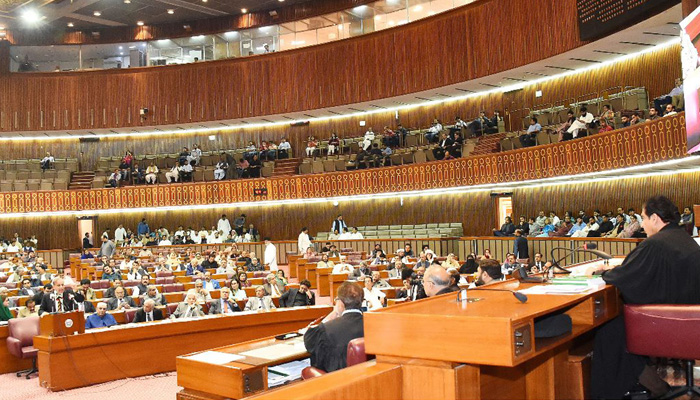Senate approves 'contempt of parliament' bill
Five members to be part of parliamentary contempt committee, with powers of a civil court
July 25, 2023

- Bill tabled as part of supplementary agenda in Senate.
- It was already passed in National Assembly.
- Five members to be part of parliamentary contempt committee.
ISLAMABAD: The Senate, on a private members day, passed the 'Contempt of Majlis-e-Shoora (Parliament) Bill 2023', aiming to criminalise individuals who commit contempt of parliament or its committees, as well as those who breach the privileges of any legislator, The News reported.
During the Senate session, the bill was tabled on the floor as part of a supplementary agenda and subsequently passed through a voice vote. There were, interestingly, no objections from the opposition benches against the bill when the chair proposed it for approval.
The National Assembly had already passed the bill.
As per the draft law's provisions, offenders may be imprisoned for up to six months, a fine of up to Rs1 million, or both, once the president grants assent and it officially becomes an act of the parliament.
Four senators from Balochistan and one from Punjab, Kauda Babar, Naseebullah Bazai, Sarfraz Ahmed Bugti, Prince Ahmed Umer Ahmedzai and Rana Mahmoodul Hassan, respectively, raised objections as the house was adopting it without having been sent to the standing committee concerned for consideration, deliberations and report.
Minister of State for Law Senator Shahadat Awan of PPP said that the NA has already passed the bill unanimously and should be put to vote without being sent to the standing committee, to which Chairman Senate Muhammad Sadiq Sanjrani agreed.
It is significant that the parliament has passed the draft law at a time when there is serious tension between the executive and judiciary over the powers and formation of benches in the apex court.
Under the draft law, the parliamentary contempt committee, to be formed by the NA Speaker, will consist of five members, three from NA and two from Senate, whereas the secretary NA will act as the secretary of the contempt committee.
The proposed law empowers the speaker to constitute the contempt committee within 30 days of coming into force of this law. Two members each from the NA and Senate will be nominated by the leaders of the house and opposition in both houses and one member of the NA to be nominated by the speaker.
The committee is empowered to award punishments by a majority decision. According to the bill, whoever commits contempt under this Act, shall be punished with simple imprisonment for a term which may extend to six months or with a fine which may extend to one million rupees or both.
“The contempt committee shall have powers as vested in civil court under the Code of Civil Procedure for enforcing the attendance of any person and compelling the production of documents,” the bill reads.
Moreover, all proceedings before the committee shall be quasi-judicial, and any document produced and evidence recorded by the committee shall not be admissible in evidence in any court.
Section 10 of the bill states that any decision of a House shall be executed and enforced by a district magistrate within whose territorial jurisdiction the accused is temporarily residing under relevant provisions of the Code of Criminal Procedure, 1898. Any appeal against the decision under this law may be filed within 30 days before the speaker NA or the chairman Senate.
The privilege committee of either house shall prepare its report within 60 days with recommendations on the matter of breach of privilege or contempt of parliament and its report shall be laid in the respective house for its decision to refer the matter to the contempt committee.
The chair deferred a bill, moved by PTI Senator Dr Sania Nishtar, concerning the vendors. The bill provides for protection of street vendors livelihood (The Rehribaan, Street Vendors) Livelihood Protection Bill, 2023.
Unleashing power of gender equality
The House passed a resolution, moved by Dr Sania, recognising the importance of commemorating World Population Day on July 11 each year, as designated by the United Nations to highlight the significance of population issues.
The resolution says that acknowledging that the theme for World Population Day 2023 “unleashing the power of gender equality: Uplifting the voices of women and girls to unlock our world’s infinite possibilities,” is particularly relevant to Pakistan and other developing countries where there is an urgent need to prioritize the rights, well-being and empowerment of women and girls.
The resolution showed concern that as the world’s fifth most populous country, Pakistan’s population is projected to reach 403 million by 2050 which is expected to contribute to challenges such as poverty and unemployment, food scarcity and water crisis, housing shortages, healthcare access and human capital development, depletion of natural resources and environmental degradation.
The resolution urged upon the government to engage in multi-sectoral collaboration, involving all governmental agencies including provincial governments, civil society organizations and relevant stakeholders to work collectively towards achieving sustainable population growth and gender equality”. The House will now resume today (Tuesday) at 10:30am.











